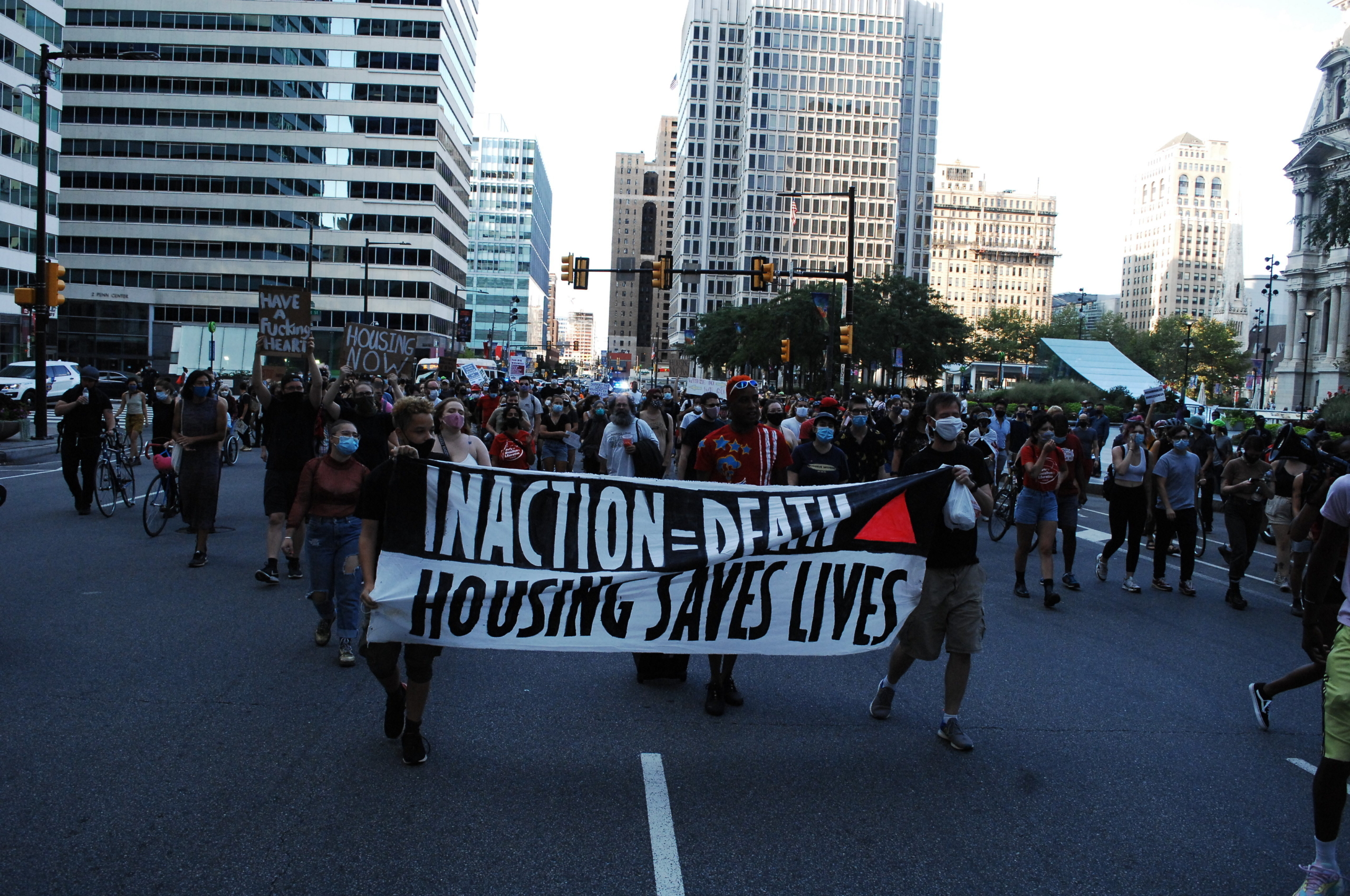Sign up for The Media Today, CJR’s daily newsletter.
In early August, a coalition of housing researchers found that as many as forty million Americans could be at risk of eviction in the coming months, as a result of a number of policy responses––and lacks thereof––to the covid-19 pandemic. The Center for Disease Control issued an eviction moratorium in September set to last through the end of this year. Still, tenants all across the country are bracing for the possibility of losing their homes in the coming months.
Matthew Desmond, a sociologist at Princeton University––where he also founded the Eviction Lab––and contributor to the New York Times Magazine, has long warned of an eviction crisis in the United States––one whose dynamics covid-19 has exacerbated, but did not create. Desmond is the author of Evicted: Poverty and Profit in the American City, a case study of the American eviction crisis set in Milwaukee amid the financial crisis of 2008, for which he followed eight low-income families in Milwaukee for more than a year to study the effects of mass evictions.
In his book, Desmond demonstrates the many ways in which eviction and the stress it carries can upend a person’s life––affecting everything from job performance to recovery from opioid addiction––and reminds us that excellent journalism looks not just at a single moment in a person’s life, but at the myriad, intertwined systems that led them there.
Journalists can learn from academics in that respect, Desmond told me recently, “by thinking of problems a little differently, with a bigger, wider lens. Editors want to know, Why should I care? Why is it timely? I think a sociologist would ask a different question: How do institutions and structures and history matter for the question you’re trying to ask?”

Courtesy of the author
In a scene early in Desmond’s book, local news media descend on a trailer park whose owner is at risk of losing his license after local government documented seventy violations, including a plumbing system that left raw sewage spreading underneath homes. Local TV media, Desmond writes, flocked to the trailer park with “shoulder-mounted cameras that looked like weapons.” Media stories at the time focused on residents’ living conditions, but not their fear of displacement. “Often, middle-class journalists can’t understand the fear of being displaced,” Desmond said. Many of the residents he lived with “fear being displaced more than a broken light or boiler.” That palpable dread, in Desmond’s view, is part of what journalists are missing. “We need to find different ways of telling housing stories that go beyond the drumbeat of, ‘It’s very expensive to live in New York.’”
CJR spoke with Desmond about what else journalists miss when covering housing, the overlaps between journalism and ethnography, and writing with “catch in your voice.” This interview has been edited for clarity and length.
Evicted is a visceral book. It depicts evictions as totally encompassing. Is that how you see eviction portrayed in other media coverage?
I think where we could be better is really to tell the story about who owns our cities—the real business dynamics on the ground. If you ask me, What’s the best data that explains eviction, then I could explain, Race matters, if you live with kids that increases your odds, gender matters. But are people evicting themselves?
Did you read Tommy Orange’s book There There? There’s this scene in the book where a character is talking about Native American suicides, and he says, “Kids are jumping out the windows of burning buildings, falling to their deaths. And we think the problem is that they’re jumping?” It’s kind of like that. It’s like, Who set the building on fire? And who’s profiting? I think that’s where we could go with media stories.
I also think we could tell better stories about the work behind housing policy. A lot of times we get stories about change—things like right to counsel, eviction court. It’s like these things just appear. But there’s usually years and years of grassroots organizing behind them. I think those things are kind of undertold.
So much of journalism is about public records. There are plenty of evictions that play out in housing court, and Eviction Lab has made a lot of progress in terms of providing concrete data. Where else should journalists be looking?
I think that journalists could be the forebearers of accountability and transparency when it comes to these issues. I think asking questions like, Who are the landlords that are responsible for the bulk of evictions? That’s a hard question, actually, with [property ownership hidden behind] LLCs and shell companies. It’s not like, Just look at the eviction records. You really have to put in some shoe leather.
A narrative arises that says, OK, if tenants don’t pay their rent, landlords can’t pay their mortgage, and they’re going to lose their home. It’s a domino effect. That sounds so logical, right? Yet in most states, if you fall behind on rent, you can get evicted in a matter of weeks. Meanwhile, if you fall behind on your mortgage, in most mortgages, it takes 120 days for the bank to even start the foreclosure process. It’s a complicated market, actually. I think the data tell a story that sometimes gets missed in the larger coverage.
Eviction Lab has been working on this covid-19 tracker studying changes to housing policy and its effects during the pandemic. What are your major takeaways from the past few months?
You see evictions at really high levels in February in most cities—even higher than average in February—and then they go down almost to zero in March and April. So I think we are learning that eviction moratoriums really matter. We also are learning that the places where moratoriums are lifting are seeing really scary early-warning signs of a pending eviction crisis. There are really non-trivial jumps above average levels and it’s concerning to see.
Your book argues that we have long been in the midst of an eviction crisis. How do you think we should be talking about this in the media? What is the best way to frame what’s going to happen as these moratoriums are lifted?
I think that this moment is making it abundantly clear how many people live incredibly close to eviction. I think it also debunks eviction as a solution if your tenants can’t pay rent. If you look at state data and you compare rent collection in states with moratoriums and those without, they’re the same. It’s important; it suggests you don’t need evictions to pay bills. I think that we see a rising consciousness about the housing crisis, especially for renters. A lot of the organizing after the ’08 recession is a product of a lot of the media coverage on it.
In your book, you wrote about how you grew close to the people you wrote about. Evicted was a work of ethnography. Is there a difference in how you approach those relationships differently when you’re reporting magazine stories?
Some of the things that I’ve done for the [Times] magazine have taken forever and have been really hard. I have a piece [published on October 13] that took a year of reporting. I think that I’ve been pushed as a researcher and as a journalist. But I’m so grateful for my training in sociology. It gave me a technical skill set, like viewing data in a certain way and knowing the data that’s out there, but it also gave me a framework for looking at the world, and for thinking about social problems, that I think does come through in the journalism.
I think the deeper implication is, you have to spend as much time with people that we write about as we can. I was on a panel with a journalist from the Times, at a conference about poverty and inequality. And she said, How many people in this room do you think have a poor person’s number in their cell phone? It allows us to write without a catch in our voice.
What do you mean by “catch in our voice”?
It’s about asking, Are we trapped in these echo chambers of debate? Are we writing about something in the way that social media writes about it? It’s writing about something in a way where I can bring it back to the people in the story and give it to them so they can recognize themselves in what I wrote.
Writing Evicted, I showed the book to everyone in it before it went to press. And I remember reading Crystal her story and she was like, ‘There’s some personal stuff in there, but that’s how it was.’ That’s such a brave thing to say. I remember Patrice laughing a lot. That’s what I want. I don’t want to reduce people to their hardships; I want to capture people in their fullness.
NEW AT CJR: A Confrontation in Public Media
Has America ever needed a media defender more than now? Help us by joining CJR today.



